By Yasushi Kudo | President, The Genron NPO
The results of this survey will be reported to the Japan-Korea Future Dialogue, an annual private-sector forum, due to be held in Tokyo on June 22, as an important reference for expert discussions there.
My general impression of the results of this year's survey is that the perception and understanding of Japanese and South Koreans on matters related to bilateral relations has become increasingly negative.
(Learn more: The 7th Japan-South Korea Joint Public Opinion Poll 2019 )
Impressions of each other
First, more people in Japan than before have a "bad impression" of South Korea today, which is a stark turnaround from last year when the number of Japanese who had a bad impression of South Korea decreased and a conspicuous trend toward improvement became apparent. According to the survey's results, about half the Japanese respondents cited "South Korea's continued criticism of history issues" as a reason for their negative impression. In this year's survey, we newly added as response alternatives "the issue of compensation for wartime laborers during Japan's colonial rule of Korea, and the radar lock-on incident involving a Republic of Korea Navy vessel and a Japan Maritime Self-Defense Force aircraft." As anticipated, this alternative was chosen by 24.2% of Japanese respondents.
Meanwhile, South Koreans' impression of Japan continues to improve, in spite of these new negative developments, with the percentage of respondents who had a good impression of Japan hitting a record high since this survey was started in 2013.
What has caused this difference? I have multiple answers to this question, but the number of visitors to each country and the sources of information used to learn about each other's country are keys to the answer.
It is obvious that the uptrend in the number of visitors, including tourists, to each other's country, is largely conducive to the improvement of Japanese and South Koreans' impressions of each other. In particular, the improvement is more conspicuous in South Korea, reflecting the fact that the number of people visiting Japan surged to as many as 7.53 million in 2018. By generation, younger generations in Japan and South Korea have a comparatively better impression of each other's country. In the case of South Koreans aged 29 or below, the number of those who have a good impression of Japan has eclipsed that of those who have a bad impression. In Japan, the difference among generations is not so conspicuous, but among those aged 39 or below, the percentage who have a good impression of South Korea, is higher than the average (20%).
A closer look at the characteristics of younger generations will be helpful in understanding why they have a good impression of each other's country. For instance, many young South Koreans obtain information about Japan via smartphone apps. Asked in this survey how they obtain Japan-related information, 64 percent of the respondents in their 20s replied "mobile phones," and the figure was as high as 71 percent for those aged 19 and below. And many young people who use mobile phones frequently tend to have a good impression of the other country, especially in South Korea. Asked why they have a good impression of Japan, many South Koreans in their 20s choose the alternative "the Japanese food culture and shopping in Japan are attractive." Compared to such a trend in South Korea, how they get information about South Korea does not affect the impression the Japanese have of their neighboring country.
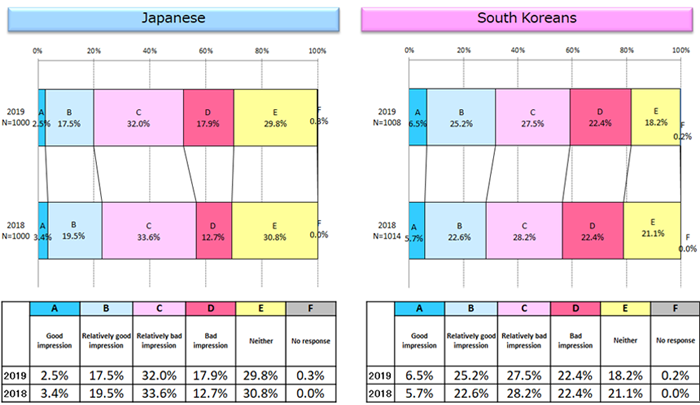
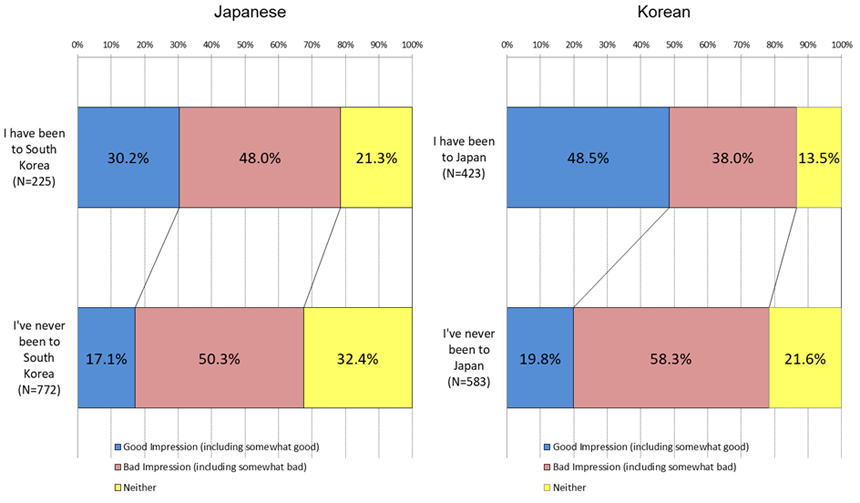
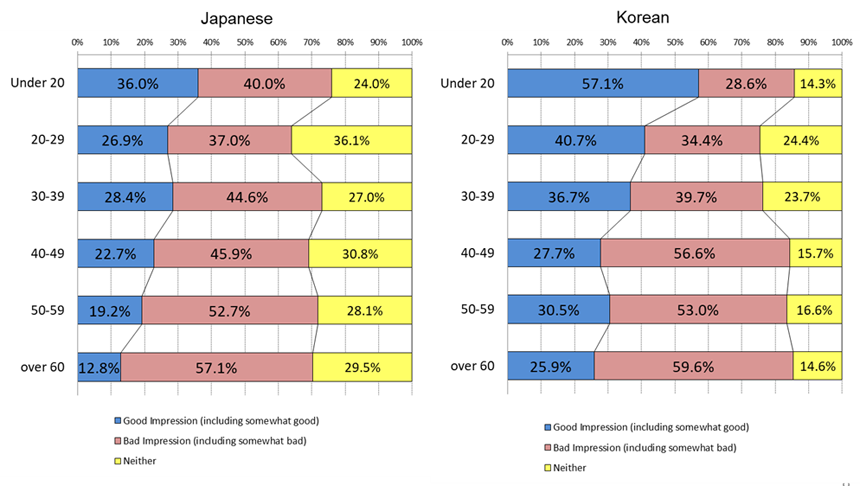
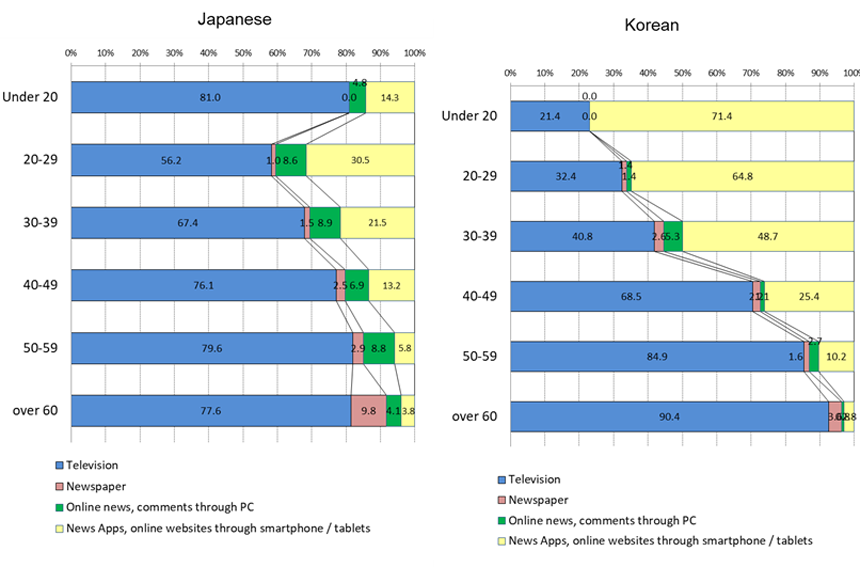
Evaluation of bilateral relationship
When it comes to the evaluation by the people of both countries of overall bilateral relations, the situation is not promising.
The number of respondents who feel the Japan-South Korea bilateral relationship is "bad" is increasing in both countries, compared to the 2018 survey. In last year's survey, there was an improvement on both sides from the preceding year, but this year's survey found that the percentage of negative responses in both countries is much higher than that in 2017.
Specifically, the combined percentage of South Korean respondents, who feel the bilateral relationship is "relatively bad" or "extremely bad," increased by only 11 points to 66.1%. In contrast, the corresponding figure of Japanese respondents surged steeply by 23 points to 63.5%, and the percentage of those who feel the relationship is "extremely bad" goes up by an alarming 13 points to 18.0%.
What is worrisome is that the negative Japanese evaluation of current government-to-government relations between Japan and South Korea leads to a bleak outlook for future bilateral relations. Asked about their view on future Japan-South Korea relations, the largest percentage (50%) of South Korean respondents see the present state of relations continuing. But the largest percentage (33.8%) of Japanese respondents foresee further deterioration of the bilateral relationship.
Perhaps this raises the question that the negative evaluation of bilateral government-to-government relations may be affecting the impression of each other's country. So far as South Korea is concerned, the answer is in the negative. Despite the deterioration of bilateral relations, South Koreans' impression of Japan is not affected so much. However, 45.9% of Japanese respondents say their impression of South Korea has turned "bad" over the past year, showing the correlation between the confrontations in governmental relations and the public image of the neighboring country.
Asked about their impression of the top political leader in the other country, the percentage of Japanese respondents who have a bad impression of South Korean President Moon Jae-in has almost doubled from a year ago to 50.8%. Similarly, close to 80 percent of South Korean respondents, or almost the same level as last year, have a bad impression of Japanese Prime Minister Shinzo Abe.
This year's survey asked the people of both countries how they feel the Moon Jae-in administration is handling Japan-related matters. As many as 57.3% of Japanese respondents replied they do not approve of what it is doing. Surprisingly, 35.4% of South Koreans gave the same response, surpassing the 21.5% who expressed their approval.
For this year's survey, we added two new questions in light of the harsh bilateral relations.
One asked what they think both countries need to do to overcome the difficulties in the Japan-South Korea relationship.
The most popular answer on both sides, 40.2% in Japan and 70.8% in South Korea, is that "both countries should make efforts to improve bilateral relations." It is noteworthy that such efforts are winning support among the people of both countries, whereas the two governments are seemingly hesitant to do anything to improve the situation. The fact is that those who favor the three options of "Better stay indifferent, "No need for Japan to do anything" and "No interest in the future of bilateral relations at all" amount to 31% of Japanese respondents. In the meantime, many Japanese respondents, in their replies to a different question, call for "self-control to avoid confrontation" and "a future-oriented approach."
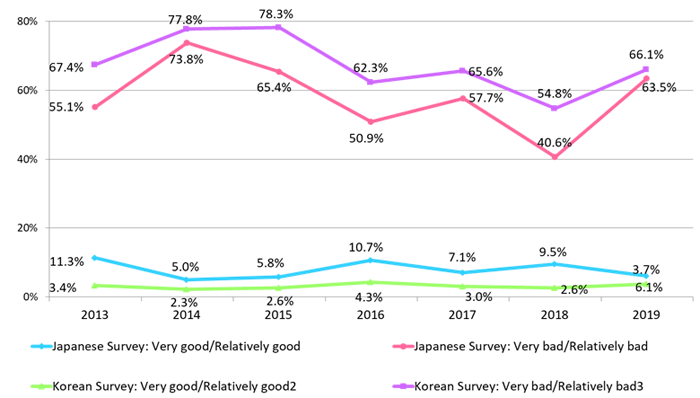

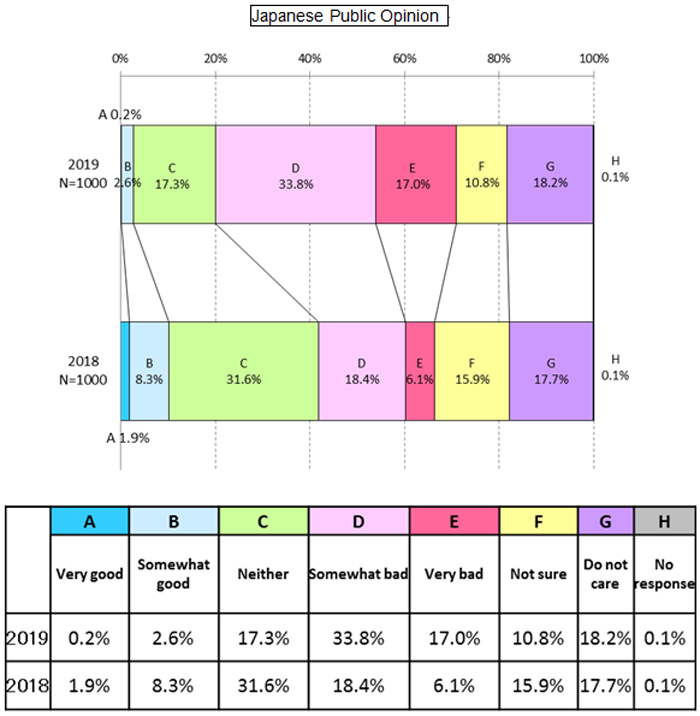
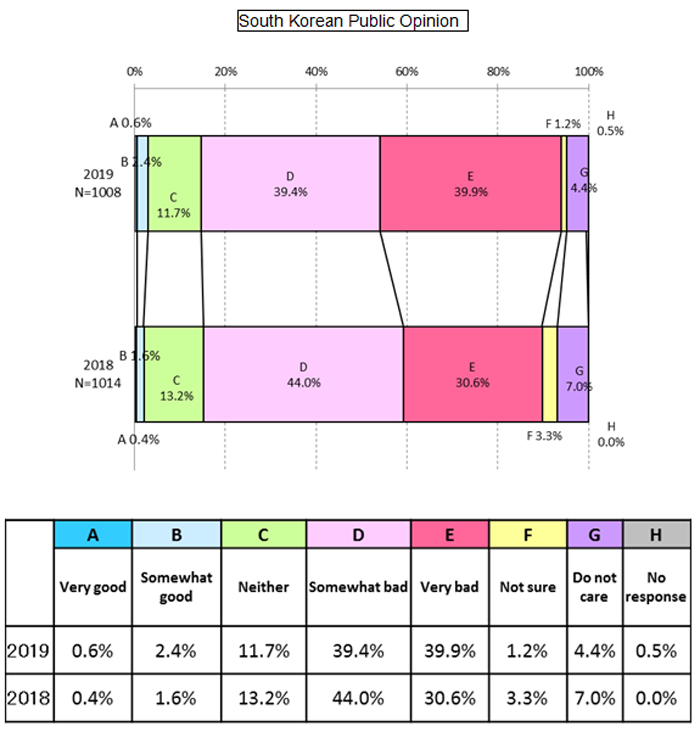
Friendly country or not
The second new question we added is "Do you think Japan and South Korea are friendly countries in the first place?"
To this sensitive question, the largest percentage (35%) of the Japanese respondents replied "Neither," indicating that many Japanese are at a loss as how to judge this matter. However, 21.4% said, "South Korea was formerly a friendly country, but today, I cannot think that way." If combined with the 22.5% who replied "I haven't thought of South Korea as a friendly country for some time," more than 40 percent of Japanese do not think today that South Korea is friendly toward Japan. By generation, such anti-South Korea sentiment is strong in those aged 60 and above, or 55.6% of those in this age category. Conversely, 11.6% of those in their 40s show empathy with South Korea, the highest among different generations, saying they feel South Korea is friendly toward Japan.
In South Korea, more than half the respondents, or 52.9%, replied they have never thought of Japan as a friendly country from the very beginning. If combined with the 12.7% who replied "Japan was formerly a friendly country, but I cannot think that way now," 65.6% of South Koreans now perceive that Japan is not their friend. By gender, men tend to think that Japan has never been a friendly country. By generation, the percentage of those with anti-Japanese sentiments is 60.6% in their 40s, 55% in their 50s and 55.4% in their 60s. To the relief of Japan, 21.4% of South Korean teenagers perceive Japan as a friendly country.
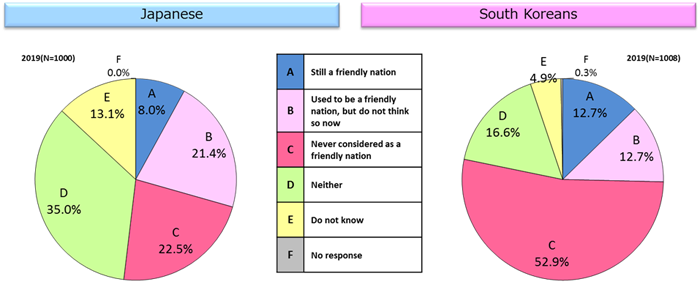
The importance of bilateral relations
Then, how do Japan and South Korea perceive the importance of bilateral relations?
To our astonishment, as many as 84.4% of South Korean respondents say that Japan-South Korea relations are "important." But the corresponding figure in Japan is only 50.9%, the lowest since this survey was started in 2013.
As reasons for the importance, many Japanese cite such general perceptions as "the neighboring relations" and "the same identify (identity??) as an Asian country." In addition to these reasons, many South Koreans attach importance to mutual dependency in terms of economy and industry, and relations as trading partners.
And 22.4% of Japanese cited the common security interest shared by Japan and South Korea through their alliance with the United States. But the corresponding figure in South Korea is a meager 9.8%. Aside from the bilateral perspectives, only 1-plus percentage point of the people in both countries think of the other country as an important ally from a global perspective. Japanese consider the United States as an important ally from a global perspective, while 55.5% of South Koreans share the view, citing China next, with 33.3 percent.
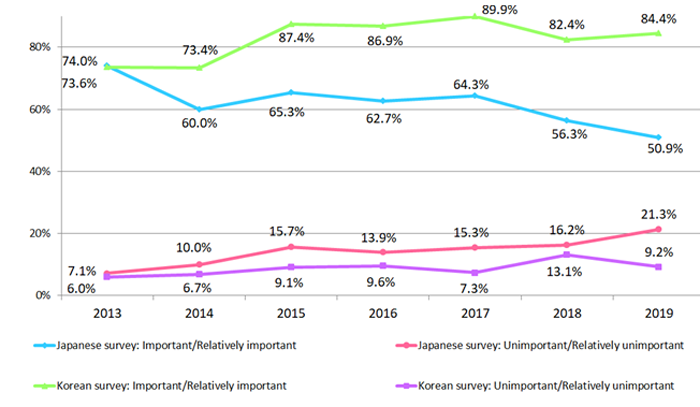
New developments impede improvement
In this survey, we took up the two latest developments in bilateral relations - the issue of compensation for wartime laborers during Japan's colonial rule of Korea, and the radar lock-on dispute involving a South Korean Navy vessel and a Japan Maritime Self-Defense Force aircraft. In sum, this survey found that Japanese and South Koreans are taking 100-percent opposing views on the two issues.
For instance, 75.5% of South Korean respondents say they "appreciate" the Supreme Court of Korea's decision in October 2018, demanding that Japanese companies pay compensation for wartime forced labor. But 58.7% of Japanese say they "do not support that." It should be remembered that 18.6% of South Koreans and 33.6% of Japanese replied with reservations, saying "I don't know."
In order to solve this issue, close to 60% of South Koreans think the Japanese companies concerned should pay compensation, as ordered by South Korea's top court. But only 1.2% of Japanese think so, and some 20% favor the settlement of the issue "by means of the bilateral arbitration committee or the International Court of Justice" and another 20% call for the "payment of compensation by the South Korean government." And 16.5% of Japanese and 7.2% of South Koreans say they think it will be "difficult" for the two countries to solve this issue. Asked what Japan should do if South Korea were to seize or sell the assets of the Japanese companies involved, 55% of Japanese respondents said they support any countermeasures by the Japanese government.
Another was the incident in December 2018, when a South Korean Navy vessel allegedly directed its fire-control radar at a Japan Maritime Self-Defense Force aircraft on surveillance, which Japan claims is a hostile act that is taken one step before actual firing. The South Korean government's assertion differs greatly from the Japanese government's argument. Even now, 62.9% of Japanese respondents say they believe the Japanese government's version of events, while 61.9% of South Koreans support their government's argument.
Nonetheless, only 15.7% of Japanese and 15.5% of South Koreans think that bilateral defense cooperation should not be sacrificed, despite the growing confrontation between the defense authorities of both governments. And more than 40% of Japanese and South Korean respondents say the defense authorities of the two countries should first try to restore mutual trust and improve communications. In addition, 12.8% of Japanese and 20.4% of South Korean respondents favor the continued promotion of bilateral defense cooperation.
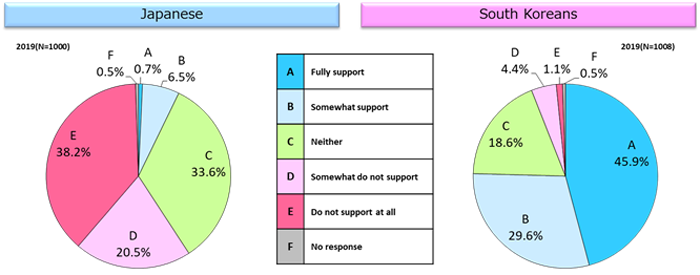

Growing suspicion about Pyongyang's denuclearization
Finally, this year's survey found suspicion mounting in South Korea about North Korea's avowed denuclearization, in sharp contrast to the 2018 survey. The previous survey was conducted around the same time as the flurry of backroom negotiations in preparation for the historic summit between U.S. President Donald Trump and North Korean leader Kim Jong Un on June 12, following the meeting of the North and South Korean leaders April 27.
Due largely to the failure of the second Trump-Kim summit Feb. 27-28 in Vietnam, 47.4% of Japanese respondents have a negative view regarding the realization of Pyongyang's denuclearization. In South Korea, 34.5% say they either think it difficult to realize that goal or always thought it would never be realized. This figure surpasses the 31.4% who still believe the goal will be realized. In last year's survey, some 60% of South Korean respondents believed the denuclearization would be realized either "in a short period" or "in the long run." Indeed, South Korean people's expectations of North Korea's denuclearization have receded largely over the past year. Meanwhile, 80% of Japanese and 70% of South Koreans don't trust North Korean leader Kim Jong Un's willingness to denuclearize his country, according to this year's survey.


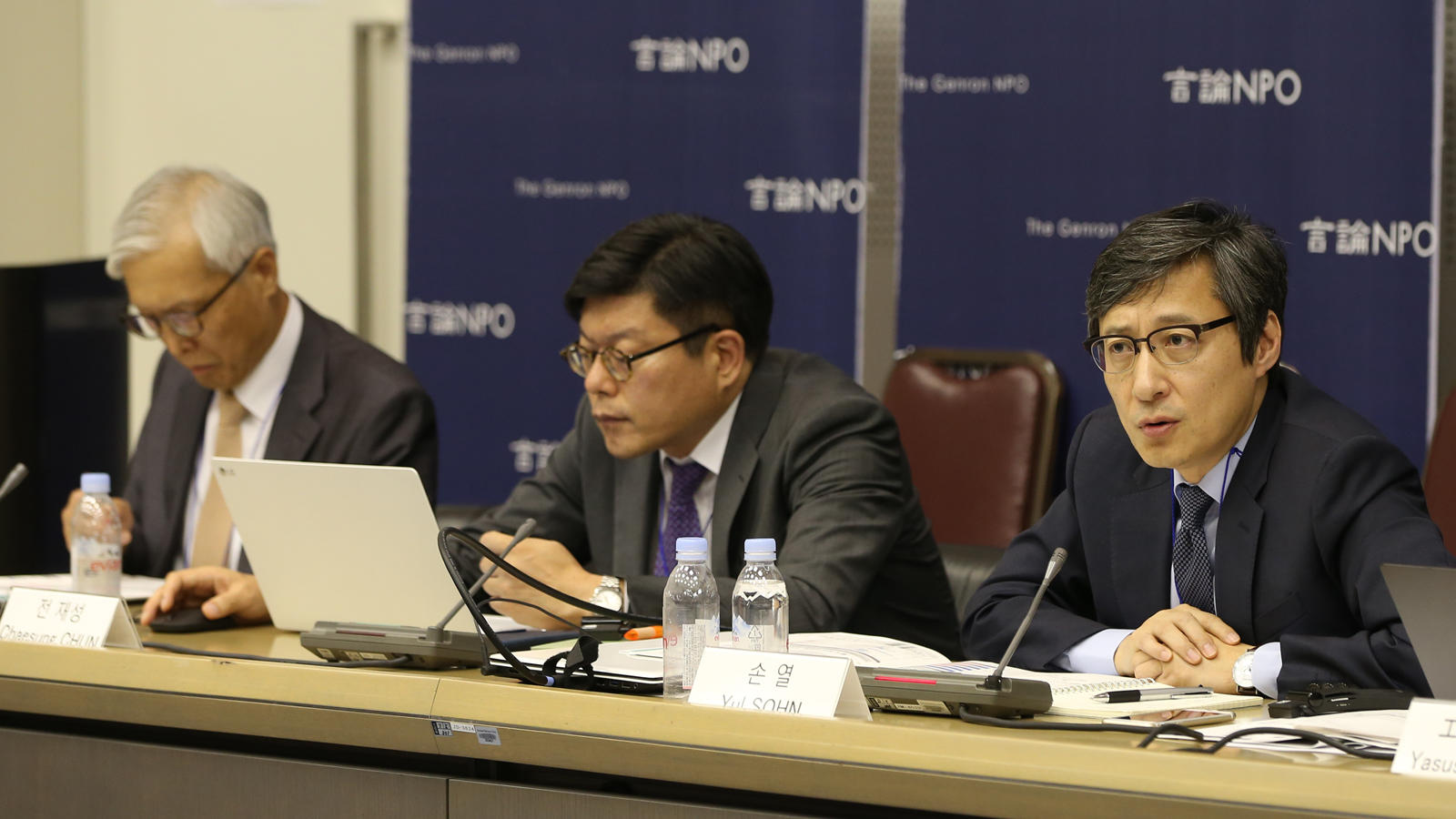
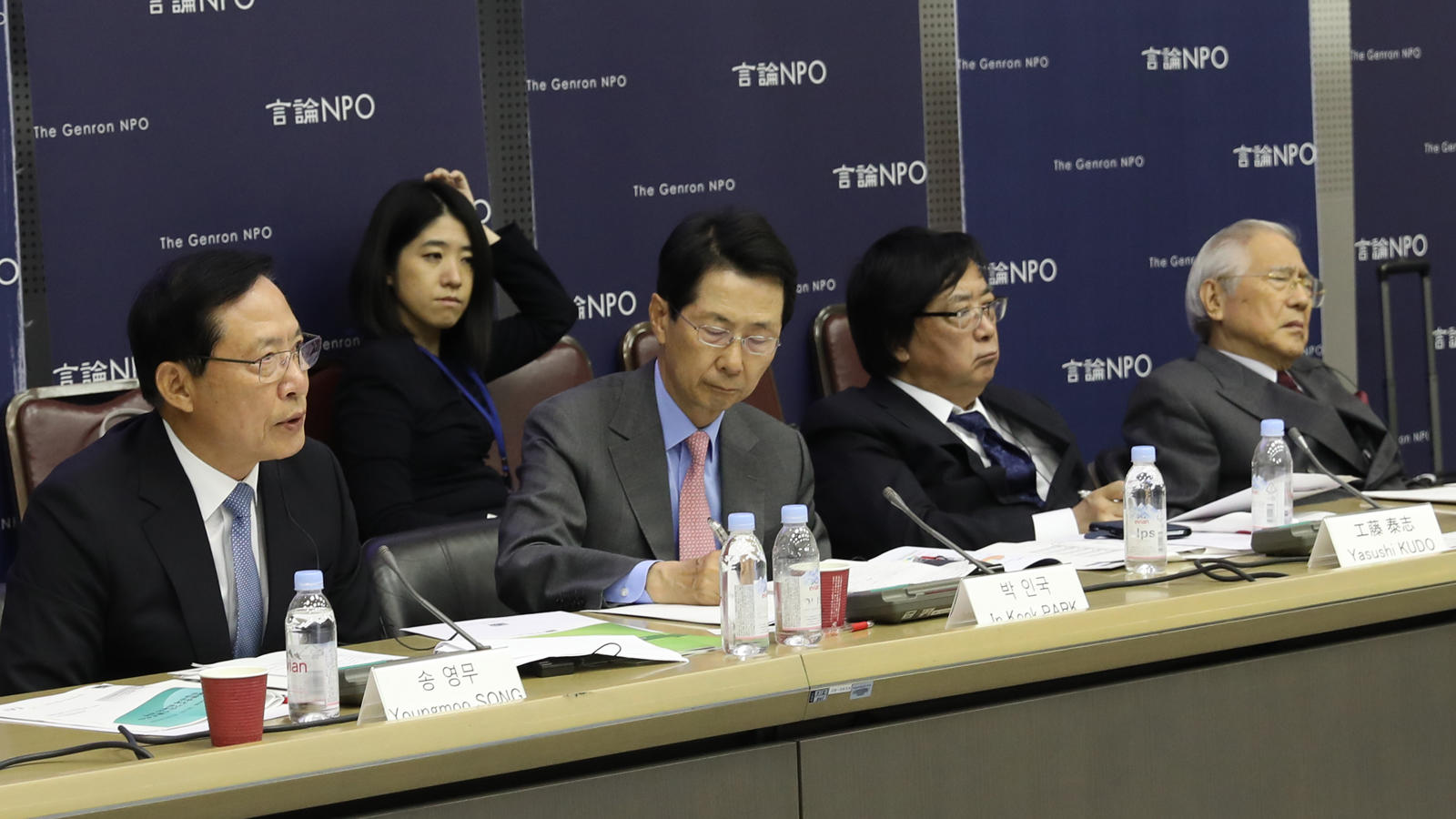

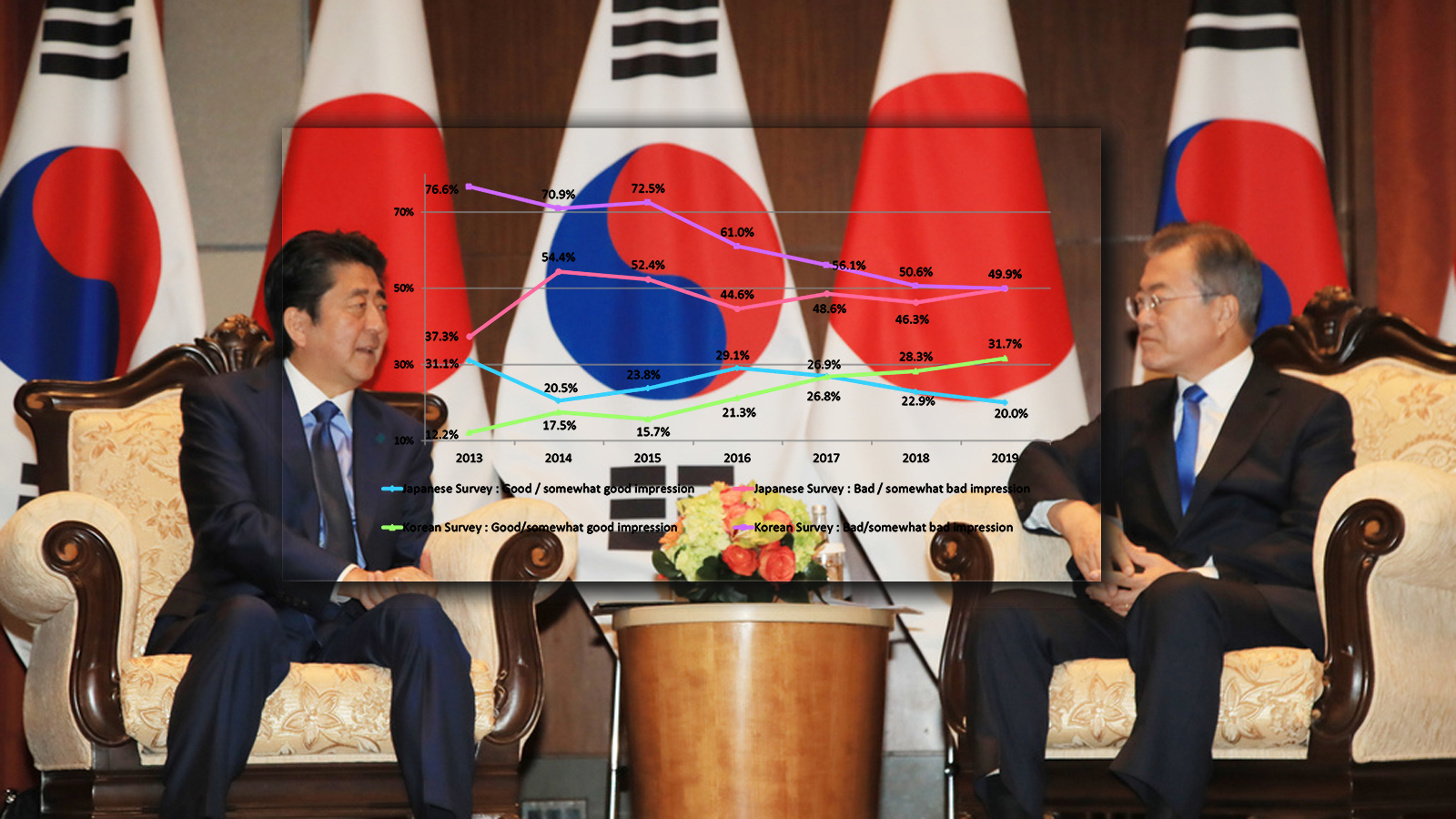
Post a comment